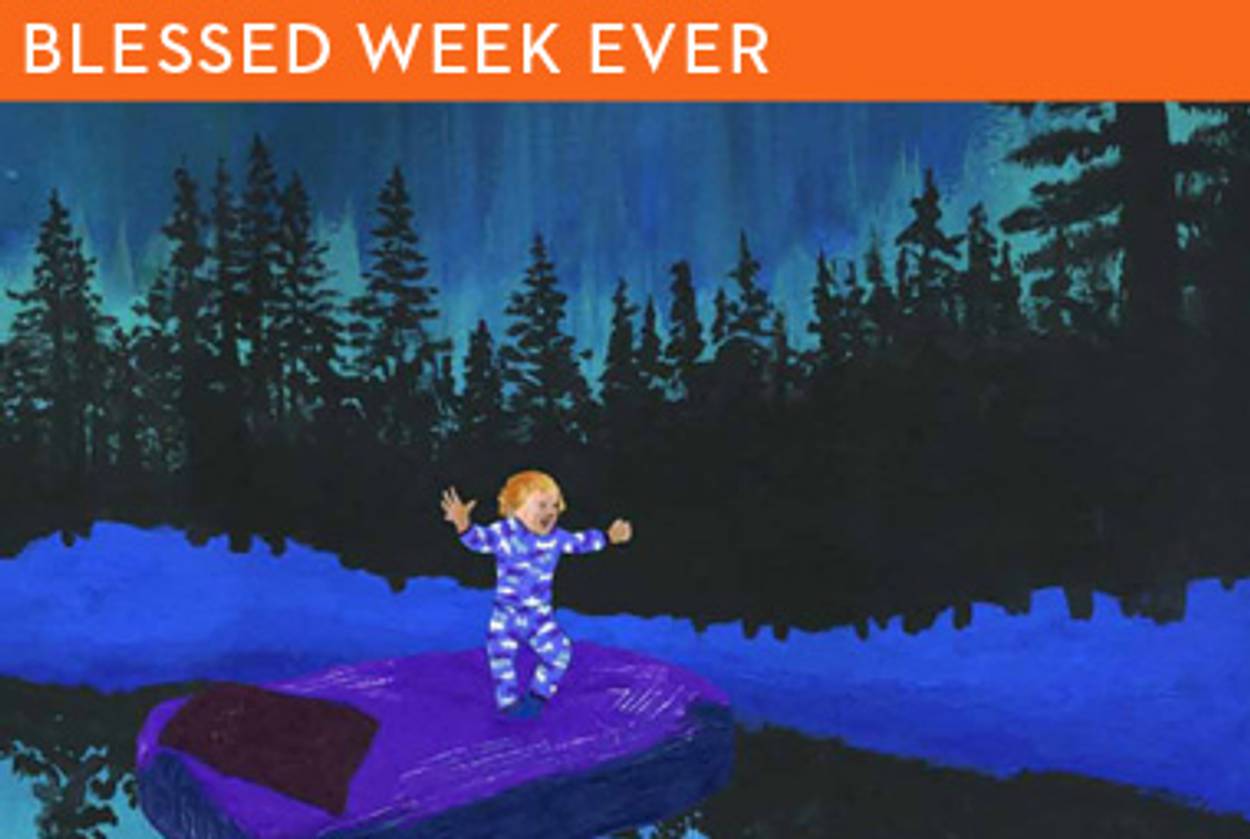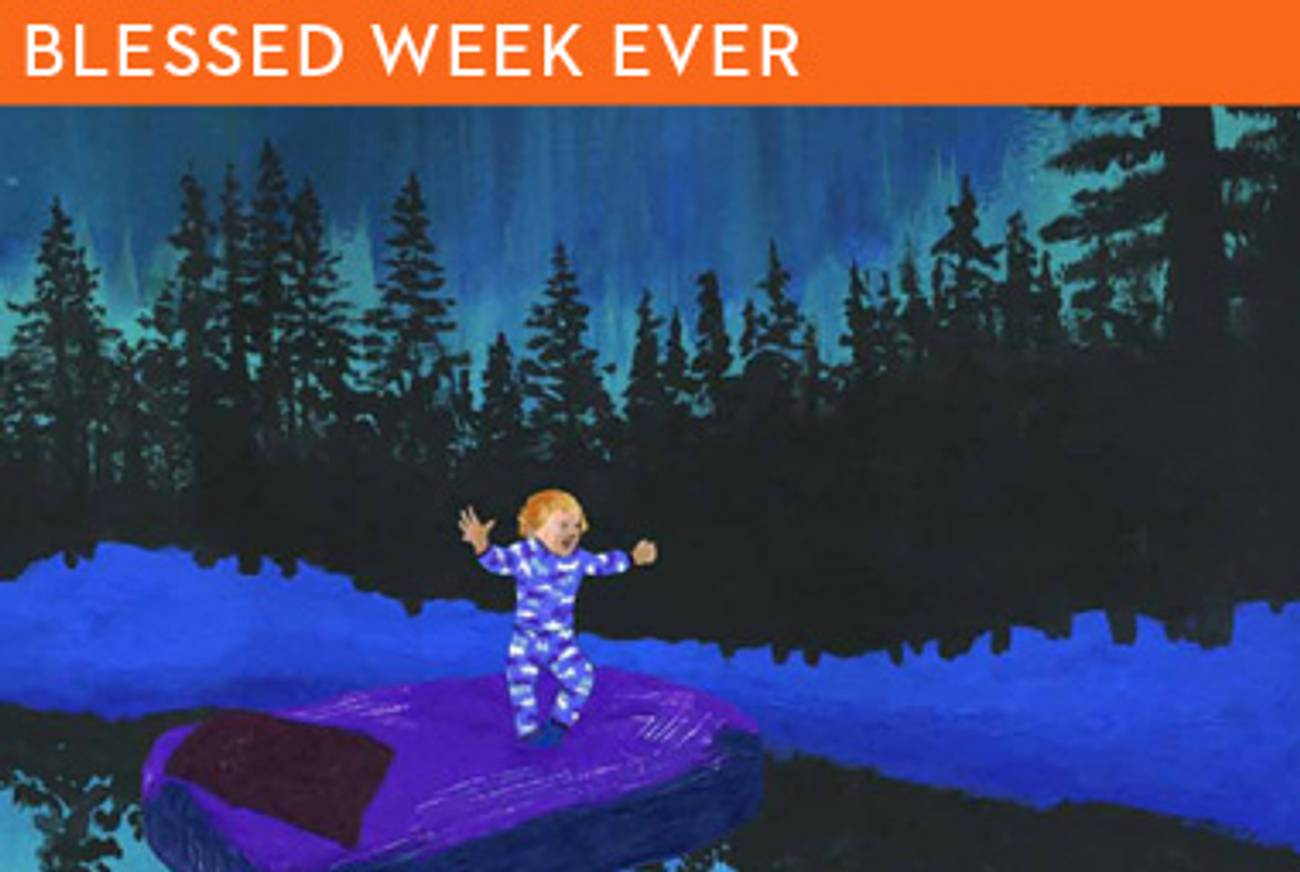Curses
The Torah and the recent hit children’s book Go the F**k to Sleep both stress the importance of being aware not only of kind words but of damning ones as well




Earlier this month, a young author from Brooklyn named Adam Mansbach appeared on WNYC’s Brian Lehrer Show. Mansbach had written several well-received novels, including The End of the Jews, an intriguing and spirited account of two Jewish writers, an old literary lion and his grandson, who battle each other for material and inspiration. But he wasn’t on New York public radio to talk about Jews or novels; he was there to discuss his latest work, the picture book Go the Fuck to Sleep.
Few literary efforts in recent memory have received the sort of instant, uproarious attention as Mansbach’s tome, referred to knowingly online as GTFTS. The book began as a Facebook joke, hit the top spot on Amazon.com before its actual release, and became an immediate best-seller, complete with readings by Werner Herzog and Samuel L. Jackson and a film version in development. This is a stellar achievement for any book, but much more so for an illustrated tale for adults revolving around one four-letter word and one exasperating concept, a toddler refusing to succumb to slumber.
But not everyone is happy. As Mansbach was chatting with an audibly thrilled Lehrer—it is not every day that an NPR host gets to say such naughty words, even if bleeped—a disapproving caller came on the air. It was Rosemary Wells, the celebrated author of many illustrated children’s books, a number of which follow the adventures of Max and Ruby, two adorable bunny siblings. Even though GTFTS was clearly intended for adults, Wells said she worried it was sending the wrong message.
“We live in the age of excessive child abuse and vulgarity,” she said, “and I’m very worried about this book validating the kind of talk that most of our underprivileged kids get day and night. In other words, it makes a joke out of something that’s really serious in kids’ lives, too much abusive talk.”
Mansbach parried politely, and Lehrer soon moved on to the next caller, but listeners were left with a lingering sense of conflict. The disagreement between the two authors was caused by more than the natural void separating a young and irreverent novelist and an older, more conservative writer and illustrator. Rather, each author represented, whether knowingly or not, a profound philosophical position. For Wells, civility—and, indeed, civilization—depend on the maintenance of a sacred space in which children can grow up unexposed to bad words and sensationalist sentiments. For Mansbach, there are no sacred spaces and little point in masking the rough emotional terrain we navigate each day with pleasantries or metaphor.
To better understand these positions and their implications, we would do well to read the first lines of this week’s parasha. “Behold,” says God, “I set before you today a blessing and a curse. The blessing, that you will heed the commandments of the Lord your God, which I command you today; and the curse, if you will not heed the commandments of the Lord your God … you shall pronounce the blessing at Mount Gerizim, and the curse at Mount Ebal.”
There are several curious things about this short passage. First is the even-handed and detached tone in which God presents both options; good deeds, he says, deserve blessings and bad deeds a curse, but the consequence of neither is discussed in detail and neither is endorsed. God, put simply, is telling the Israelites that blessings and curses exist, and to remember he commands them to assign to each a mountain, so that the chosen people might have a topographical reminder of good and evil.
The reason behind this peculiar designation has to do with Mansbach’s book. Although Mansbach’s curse words are of a different metaphysical order than God’s—the former releasing some steam at an annoying child, the latter smiting a sinful nation—they stem from the same recognition that kind words are meaningless unless we also know vicious ones, and that we should keep both prominently in our vocabulary, immovable as mountains. God assigns moral values to Ebal and Gerizim so that we may never forget that we have the free will to climb both, pursuing either righteousness or malice. It’s our choice.
And yet Wells, along with many educators, disagrees. When it comes to children, they support a one-mountain solution, an approach that champions showering children with blessings while letting not a curse sneak by. It makes common sense: After all, one can argue, children will have plenty of opportunity to wise up to the vulgarities of the world and needn’t be overly exposed to profanity, especially when they’re too young to contextualize language and grasp its nuances. But such protectiveness isn’t necessarily benevolent: Lacking a way to channel bad feelings—feelings too dense and volatile to flow through the acceptable channels parents and teachers like to promote—children might resort to much worse things than bad words. When cursing at someone in school is anathema, a child is likely to turn to Facebook; by the time he or she logs on, a momentary displeasure with a peer can very likely grow into a deeper resentment, and a four-letter word mushroom into a lengthier, more hurtful screed.
The stratospheric success of Go the Fuck to Sleep, I suspect, had much to do with the frustration we adults feel toward a society that automatically tags certain sentiments as vulgar, telling children that the only appropriate way to resolve conflict is by talking quietly and politely and telling parents that the only feeling permitted is one of contentment and gratitude. Fuck that. We, adults and children alike, are very often mad as hell, for no other reason than being perfectly human. And we need to see both mountains, need to hear all sorts of things, need to know our universe is not all blessing, not impossibly and repressively sweet.
Liel Leibovitz is a senior writer for Tablet Magazine and a host of the Unorthodox podcast.
Liel Leibovitz is editor-at-large for Tablet Magazine and a host of its weekly culture podcast Unorthodox and daily Talmud podcast Take One. He is the editor of Zionism: The Tablet Guide.